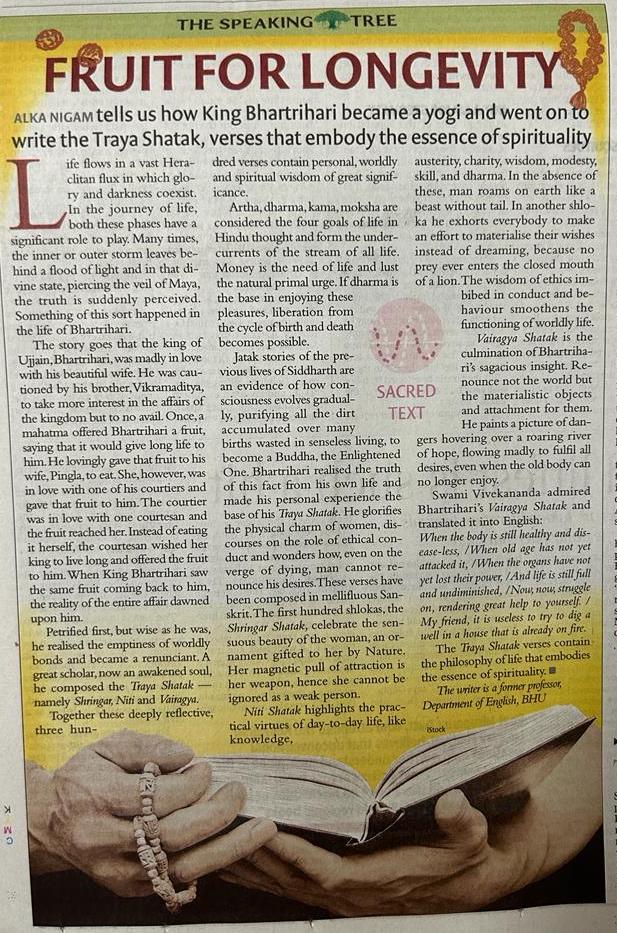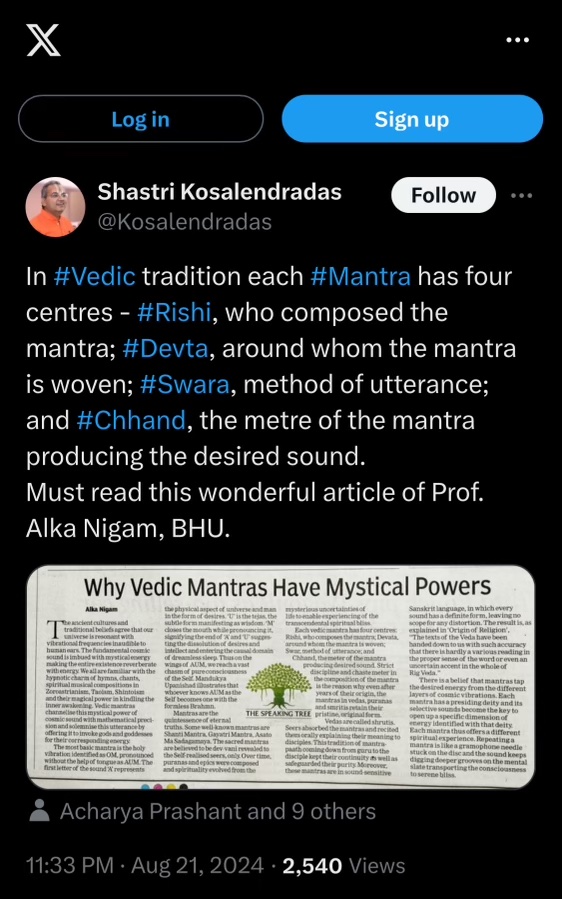Published: March 15th, 2023; Speaking Tree, The Times of India
https://www.speakingtree.in/article/fruit-for-longevity

Life flows in a vast Heraclitan flux in which glory and darkness co-exist. In the journey of life boththese phases have a significant role to play. Many a times the inner or outer storm leaves behind a flood of light and at that divine state, piercing the veil of illusionary Maya the truth is suddenly perceived. Something of this sort happened in the life of Bhartihari.
Bhartihari was a great king of Ujjain madly in love with his beautiful wife. He was cautioned by brother Vikramaditya to take more interest in the affairs of kingdom but of little avail. Once a Mahatma offered him a fruit saying that it would give long life to him. He lovingly gave that fruit to his wife Pingla to eat. She, however, was in love with one of his courtiers and gave that fruit to him. The courtier was in love with one prostitute and the fruit reached her. The prostitute took a pragmatic step. Instead of eating it herself she wished her King to live long and offered the fruit to him. When king Bhartihari saw the same fruit coming back to him, the reality of the entire affair and queen’s insincerity dawned upon him. Petrified first but wise as he was, he realized the emptiness of worldly bonds and became a renunciant. A great scholar, now an awakened soul ,he composed SHATAKA TRAYA–namely SHRINGAR, NITI and VAIRAGYA. Together these deeply reflective three hundred verses contain personal, worldly and spiritual wisdom of immense significance. In present times the social milieu might have changed but the ideas expounded in SHATAKA TRAYA are still relevant. A keen insight into the intrinsic character of human beings combined with an ability of an astute penetration into life’s complexities makes this collection practical and precious and accounts for its immense popularity. We can read his poems a hundred times and they still keep their freshness .
Arth, Dharm, Kaam, Moktch are considered the four goals of life in Hindu thought and form the undercurrents of the stream of all life. Money is the need of life and lust the natural primal urge. If Dharma is the base in enjoying these pleasures, liberation from the cycles of births becomes possible. In natural course of life the progress of consciousness is gradual . Purged and sublimated it is lifted to elevated levels . Jatak stories of the previous lives of Siddarth are an evidence of how the consciousness evolves gradually to purify all the dirt accumulated in many a births wasted in senseless living to become a Buddha-the Enlightened One. Bhartihari realized the truth of this fact from his own life and made his personal experience the base of his SHATAKA TRAYA consisting of three sections having a hundred shlokas each. He glorifies the physical charm of women, discourses on the role of ethical conduct and wonders how even in the jaws of death man cannot renounce his desires.
A distinguished artist, Bhartihari has composed the verses in mellifluous Sanskrit. The first hundred shlokas in the section SHRINGAR SHATAKA celebrate the sensuous beauty of women, an ornament gifted to them by Nature. Her magnetic pull of attraction is her weapon hence she cannot be ignored as a weak person. NITI SHATAKA lays importance on the practical virtues of day-to-day life like knowledge ,austerity, charity , wisdom, modesty ,skill, dharma. These virtues give pragmatism that helps solve the problems of life in an open and analytical way and thus makes it comfortable and smooth. In the absence of these, such a man is compared by poet with a beast roaming on earth without tail. In another shloka he exhorts everybody to make hard efforts to materialize their wishes instead of just dreaming because no prey ever enters the closed mouth of a lion. The wisdom of ethics imbibed in conduct and behaviour smoothens the functioning of worldly life. The BAIRAGYA SHATAKA forms the culmination of Bhartihari’s sagacious insight. The last phase of life is given the magical pill of fearlessness to be free at last. And this freedom comes with renunciation of attachments of all sorts because all the objects of the world are fraught with fear—wealth fears of being stolen, beauty fears old age, might fears defeat and body fears death. Renounce not the materialistic objects of the world. Just snap off the chain of attachment that ties us from them. When there are no ties there is no fear. Using apt images he paints a picturesque picture of dangers hovering over a roaring river of hope flowing madly to fulfill the desires even when the old body can no longer enjoy. This river of life is turbulent with strong waves of challenges, full with the crocodiles of lust, dangerous whirlpool of attachments, and the high shores of worries. Only those can cross the river who are without a trace of lust for anything and only these can enjoy the pure bliss. Swami Vivekananda greatly admired Bhartihari’s BAIRAGYA SHATAKA and translated it into English:
We become decrepit with age, but not so Desire.
Infirmity assails us, the skin wrinkles,
Old age comes on.
Desire alone grows younger everyday.
The SHATAKA TRAYA contains the philosophy of life that embodies the essence of spirituality .
ALKA NIGAM

Leave a Reply